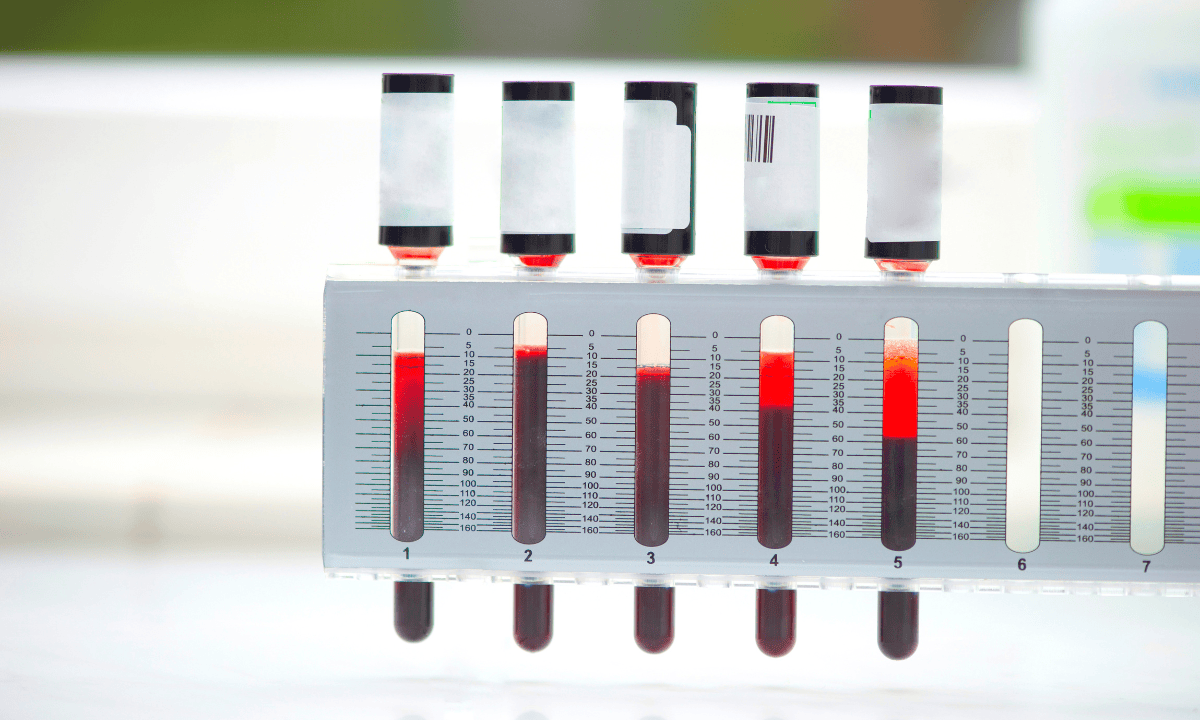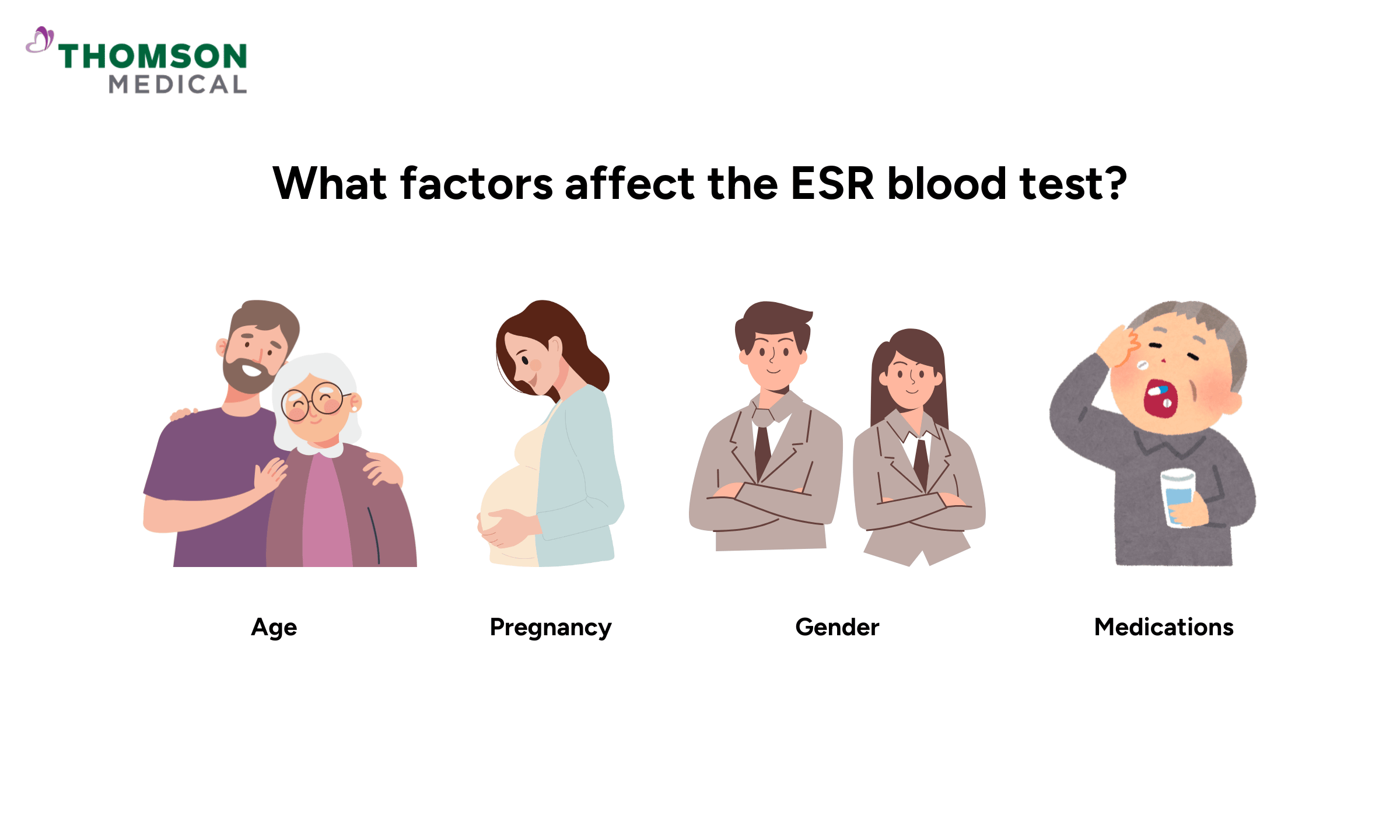What is an erythrocyte sedimentation rate (ESR) blood test?
An ESR blood test, also known as a sed (sedimentation) rate test, measures how quickly red blood cells (erythrocytes) sink to the bottom of a test tube within 1 hour. The faster the blood settles to the bottom of the tube, the more likely that there's an inflammation in the body.
A sed rate alone can’t pinpoint the exact cause of the detected inflammation, but it helps your healthcare provider determine what additional tests may be necessary. Because of this, an ESR blood test is usually performed alongside other blood tests, such as the C-reactive protein (CRP) test, to help in the diagnostic process.
When do I need an ESR blood test?
Your healthcare provider may recommend an ESR blood test if you are showing symptoms associated with inflammation in the body, such as:
Unexplained fever
Unexplained weight loss
Joint stiffness
Neck or shoulder pain
Headaches
Sudden loss of appetite
After your healthcare provider has confirmed the presence of inflammatory activity somewhere in the body, they can proceed with other medical tests to further diagnose your medical condition.
This blood test can also be used to monitor existing inflammatory conditions. It can aid healthcare providers in evaluating the effectiveness of your current treatment plan and how your body's responding to it.
If you're experiencing any of the symptoms mentioned above, request an appointment with Thomson Medical. Our specialists can help to assist with further diagnosis and provide a personalised recommendation.
Types of ESR blood test
There are several types of ESR blood tests available, each utilising different methods to measure the speed at which red blood cells settle to the bottom of the test tube. Here are 3 commonly used methods of the sedimentation rate test, including:

Westergren method
The Westergren method is the most common ESR blood test method that’s used. It works by placing the blood in a long (200 mm), narrow tube containing an anticoagulant. The tube is then placed vertically, and the time it takes for the red blood cells to settle to the bottom of the tube is measured.
This method is considered to be the standard for ESR testing because of it's reliability, cost-effectiveness, and sensitivity to detecting inflammation.
Wintrobe method
This blood test method works on the same principle as the Westergren method, by placing blood in a tube, albeit a shorter one (100 mm). While this method is older and less commonly used today, some laboratories still use it because it is faster and easier to use under some conditions and is useful for demonstration purposes.
However, when compared to the Westergren method, it shows lower sensitivity and may not give results with the same level of accuracy.
Automated ESR testing
An automated ESR blood test is designed to help improve accuracy while providing faster and more consistent results. This advanced system utilises various technologies, such as mathematical calculations, to measure sedimentation rates based on the early stages of red blood cell clumping.
In addition to the automated analyser, this machine is also equipped with closed blood tubes. This helps protect the lab technician from unnecessary exposure to blood samples and minimises the possibility of external influences like temperature affecting the results.
What to expect during an ESR blood test
An ESR test is a simple blood test that usually doesn't require any special preparation. In this procedure, your healthcare provider will only draw a small amount of blood from a vein in your arm.
To make the vein more visible and aid blood transfer, your healthcare provider will first tie a bandage around the top of your arm. Then the puncture area will be sterilised with antiseptic before inserting a small needle to draw your blood.
Once the blood is collected, the needle is removed, and a piece of gauze and a bandage will be placed over the puncture site. The entire procedure usually takes less than five minutes.
What do the results mean?
The results of your sed rate test are measured in millimetres per hour (mm/h), which indicates how quickly red blood cells settle at the bottom of a test tube in one hour. Normal ESR values vary by age and gender:
For men under 50 years old, a normal ESR is less than 15 mm/hr.
For women under 50 years old, a normal ESR is less than 20 mm/hr.
For men over 50 years old, a normal ESR is less than 20 mm/hr.
For women over 50 years old, a normal ESR is less than 30 mm/hr.
For children, a normal ESR is less than 10 mm/hr.
If your ESR results are higher than these standard ranges, it may indicate elevated levels of inflammation in the body and may warrant further investigation. Here are some common conditions associated with a high ESR, such as:
Autoimmune diseases (like rheumatoid arthritis or lupus)
Vascular disease, such as heart disease or arteritis (inflammation of the blood vessels)
Giant cell arteritis, which is an inflammation of the arteries that supplying blood to the head, neck, upper body, and arms.
Chronic kidney disease
Thyroid disease
Anemia
Cancer
A low sed level is generally nothing to worry about, as it may indicate the absence of inflammation. However, if the ESR drops significantly below the normal range, it may suggest an underlying medical condition that affects blood properties.
Here are some conditions that can lead to a low ESR, such as:
Polycythaemia is a condition where there is an abnormally high number of red blood cells in the blood, causing it to be thicker.
Hypofibrinogenemia, which refers to low fibrinogen (a protein involved in blood clotting) in the blood, causes red blood cells not to clot easily.
Sickle cell disease, which is a mutation of the red blood cells, causing them to be misshaped to a crescent or sickle.
Leukocytosis, characterised by a very high white blood cell count, can disrupt the process of red blood cell sedimentation.
Heart failure, which impairs the heart's ability to pump blood effectively, can alter the viscosity of the blood.
Accuracy of test results
While the ESR blood test is a widely used method to detect inflammation, it might not always provide reliable results. Various conditions can affect the characteristics of blood and alter how quickly the red blood cells sink in a sample of blood.

Here are some conditions that can affect the sed rate values, such as:
Age
Baseline ESR levels generally increase with age, so older adults may have naturally higher ESR values even in the absence of inflammation.
Gender
Women usually have higher ESR values than men, meaning that a high ESR result in women does not necessarily indicate a specific medical condition.
Medications
Medications that lower inflammation, such as steroids and NSAIDs, may artificially lower the value of ESR compared to the actual inflammatory condition.
Blood thinners, which work like an anticoagulant, can affect the sedimentation process and lead to less accurate readings.
Pregnancy
During pregnancy, ESR levels are naturally heightened due to hormonal fluctuations and alterations in blood composition.
Menstruation
Hormonal changes during menstruation can also temporarily increase ESR levels.
Lifestyle
Studies indicate that alcohol consumption and regular high physical activity correlate with lower ESR levels.
In contrast, overweight or obese individuals tend to have high ESR values.
Because of these variables, healthcare providers usually do not rely solely on ESR results to diagnose a condition. Instead, ESR is used as part of a blood test to determine the exact cause of inflammation.
If you want to learn more about ESR blood tests and whether they are appropriate for your specific medical condition, request an appointment with Thomson Medical. Our specialists can help provide more information and make a personalised recommendation on whether this blood test is suitable for you.
Are there any risks to this test?
Since the sedimentation rate test simply requires your blood, it is a fairly low-risk blood test. However, since it includes taking blood directly from the vein, there are a few minor discomforts that you may experience, such as:
Slight bruising, swelling, or soreness at the punctured site.
Slight pain or discomfort around the punctured area.
A slight sting during the needle insertion or removal.
Dizziness due to the withdrawal of blood.
FAQ
What does it mean if an ESR is high?
A high ESR (erythrocyte sedimentation rate) means your red blood cells sank faster than normal and may indicate the presence of inflammation in the body.
However, it doesn't specify the exact cause of the inflammation, so it's usually used in conjunction with other blood tests to help doctors diagnose or monitor various conditions.
What level of ESR is concerning?
Elevated ESR levels are an indicator of inflammation, but they can also be influenced by factors such as age, gender, and certain medications.
That said, an ESR level exceeding 100 mm/h is especially concerning, as it often signals the presence of an active disease or infection requiring immediate medical attention.
What happens when ESR is low?
A low ESR value is usually nothing to worry about, as it can simply mean there’s no present inflammation. However, if your ESR is significantly lower than the standard range, it might be a good idea to consult with a healthcare provider, as it could point to an underlying condition that affects your blood properties.
Does stress affect ESR?
Stress could influence ESR levels, especially during times of intense mental or physical stress. However, its effect is usually milder compared to other causes of inflammation and may affect individuals differently.
What cancers cause high ESR?
Several types of cancer can lead to elevated ESR results, including:
Lymphomas (Hodgkin's and non-Hodgkin's)
Multiple myeloma
Breast cancer
Metastatic cancer
Pancreatic cancer
Malignant mesothelioma
Carcinomatosis
The information provided is intended for general guidance only and should not be considered medical advice. For personalised recommendations and tailored advice, please consult a specialist at Thomson Medical. Request an appointment with Thomson Medical today.
For more information, contact us:
Thomson Specialists Paragon (Health Screening)
- Mon - Fri: 8.30am - 5.30pm
- Sat: 8.30am - 12.30pm
Call: 6735 0300
Request a Health Screening